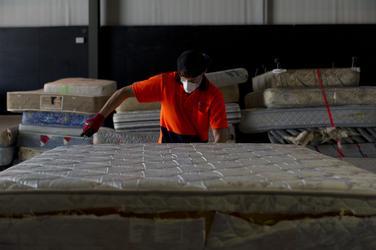Solving the problem of hard-to-recycle waste
Australians are increasingly aware of the need to recycle as much waste as possible, but some products simply do not lend themselves to easy conversion into reusable material.
Words by Richard Holdcroft
Reusing, upcycling and recycling ‘difficult’ waste to avoid it being incinerated or landfilled and to keep it circulating in the economy, is an ongoing challenge.
However with the help of innovative technologies, some conscientious Australian companies are practising product stewardship – the idea that everyone in the product supply chain takes responsibility for minimising the environmental impact of a product over its lifetime. As a result, they’re finding new ways to create new value from even the most stubbornly hard-to-recycle waste streams.
Tyre recycling picks up speed
Australia generates over 50 million used tyres a year, of which less than 10 percent are recycled locally. The rest are disposed to landfill, stockpiled, illegally dumped or exported.
Recycling tyres is inherently tricky because of their make-up: rubber, carbon black, steel and additives, which are difficult to break down and separate.
Tyre Stewardship Australia (TSA) is an industry cooperative body that includes tyre importers, manufacturers and retailers set up with government support to tackle the problem and find new uses for end-of-life tyres.
Rubberised road and pavement products including rubber crumb have been in use in Australia for some years, and TSA is working on increasing their uptake. Other uses for old tyres include civil engineering (such as retaining walls) or to make industrial flooring.
The holy grail of tyre recycling would be a cost-efficient way to break them down usable material, and TSA is promoting research of technologies such as pyrolysis (decomposition at very high temperatures).
TSA also recently accredited the next-generation “thermal desorption” technology of ASX-listed Pearl Global, which recycles tyres into usable products without toxic byproducts.
Pearl’s compact tyre processing units can fit within a standard shipping container, yet process up to 720,000 passenger equivalent tyres, or 5760 tons of rubber, a year. Pearl is currently setting up operations in Queensland and plans several more sites across Australia.
Soft landing for old mattresses
Around 1.2 million mattresses are deposited in Australian landfills annually. They are the most common item disposed of in household collections, and are also widely illegally dumped.
Bulky and cumbersome, they are tricky to recycle. The average mattress contains some 12.5kg of steel, 2kg of wood and 1.5kg of foam as well as plastic films, hard plastics and more. Many also carry toxic chemicals such as flame retardants, formaldehyde and phthalates, which can leach out of landfills.
Yet a growing number (around 400,000 a year) are being recycled in Australia by commercial operators and Soft Landing, a not-for-profit social enterprise that operates a product stewardship scheme across several Australian states and territories to divert waste mattresses from landfill and recover the components.
Soft Landing has recycled almost 700,000 mattresses since 2014. Its product stewardship partners include manufacturers such as Sealy and Sleepmaker, and retailers such as Snooze and Harvey Norman.
Each mattress is pulled apart by hand with the help of a Stanley knife, and 75 percent of components are recycled. Research is currently under way on waste-to-energy and other end-use solutions for the balance.
Planet Ark
Another Australian not-for-profit working together with companies to tackle hard-to-recycle products with innovative technologies is Planet Ark. It is known for high-profile campaigns such as Cartridges 4 Planet Ark, which has been recycling used printer cartridges for over 15 years.
Amongst other things these are used to create an additive called TonerPlas, which is created from recycled waste printer cartridge toner and soft plastics. TonerPlas is provided to road construction company Downer Group, who then incorporate it together with recycled glass and reclaimed asphalt pavement to create a road surface that is more durable than normal asphalt.
Terracycle
Terracycle is a multinational company that creates national collection systems for previously un-recycled or hard-to-recycle waste and turns it into a raw material to be used in new products.
The company offers free recycling programs funded by conscientious brands, manufacturers, and retailers to collect and recycle problematic waste. Participants earn points which can be redeemed for payments to non-profit such as schools or charities.
For example in Australia, TerraCycle works in partnership with Nescafe to process used coffee capsules, which are are collected from over 1000 locations nationwide.
The capsule plastic is shredded and cleaned for recycling, coffee grounds are composted and the aluminum melted down to be reused.
Terracycle also so-operates across Australia with Bausch + Lomb (to recycle lenses and blister packs), Australia Post (mailing satchels) and L’Oreal Australia (personal care and beauty packaging).
Find out more about the latest industry trends at AWRE 2018, kicking off at ICC Sydney on 29-30 August, register free.
-
Subscribe to the latest industry news, insights and AWRE updates.
- Subscribe

